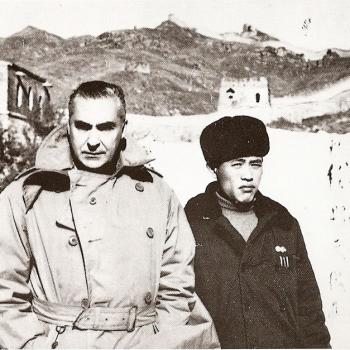Many people have tried to solve this problem. Without going through their various approaches, I think Christ gives us the answer: humility and charity. We can cleverly discern another person’s presuppositions as they relate to ours; we can disagree with them. That’s all fine. In fact, it’s necessary. But we can do so in a spirit of self-reflection, of assuming good faith (sometimes even in the face of bad faith). This is a hermeneutics of liberation.
I know; I know, being charitable, even seemingly foolish, when dealing with evil seems insane. Who wants to remain cool, calm, and collected in the face of what may seem sheer stupidity, malevolence, or both at once? But that is no excuse. We are called to be perfect as our Heavenly Father is perfect. We may trip; we may fall, but the struggle toward sanctity continues with the help of God’s grace.
All of that is to say that it’s up to us to “enter the circle” at the right point, to ensure that we are allowing the Holy Spirit to work through us in our interpretations of “texts” (words, actions, big-box stores, etc.).
This is all very abstract. I’ll give two examples: one personal (i.e. from my life) and another more-overtly political (though still rooted in concerns of mine, if I am being honest).
Recently, I had an argument with a friend, one of those silly, convoluted fights, in which you’re clearly talking past each other. I made a mistake, was well aware I had done so, and then received a sort of “talking to” from him (one of several over the last few weeks; I felt very condescended to). So when he called me to “chat,” I tried to be clear that I understood that I was wrong and was sorry, but wanted to discuss how he kept feeling the need to give me these “talking tos.” He saw this as an attempt to evade the real conversation. I raised my voice; he started leveling some (to my mind) overblown accusations. It wasn’t pretty.
This situation led me to see him as very stubborn, incapable of seeing that I wanted to talk about his treatment of me, what I saw as his condescending attitude. Eventually, everything was fine, but I should not have yelled, should not have assumed he was effectively trying to argue in bad faith by only being concerned about his side of the argument. I should have recognized what he was going through in that moment (some rather serious stuff) and weighed that as a part of my reaction. Of course, part of me still wishes he had been more open to discussing how I felt. That would’ve been ideal. But thinking that means “entering the circle” at the point labelled “I am the most important person here; my feelings are necessarily primary.” This led me to yell, to be unkind, to think and speak ill of my brother.
Another example might be stores open on Black Friday. I do not like the fact that people have to miss out on Thanksgiving so that other people can go shopping, which to me is simply a reflection of our rabidly-capitalistic culture and economic structure. I may despise certain chains for keeping people in sweatshops to sell still over-priced goods to ravenous consumers. I may find those practices totally unjust. But that does not mean I hate the people working (in fact, I feel bad for them). It does not mean that I hate those shopping (many of them need the discounts to go on living decently-comfortable lives; their tastes and desires having been shaped by the undying pressures of our economy and culture, I can’t help but understand their appreciating Black Friday). It does not even mean that I hate the CEOs and other executives at these companies, who, whatever their greed and ruthlessness are children of God with complex motivations, themselves shaped by capitalism. In short, entering at the “right point” here means keeping love alive in the face of injustice, believing that others can be converted through testifying to the truth in charity.












